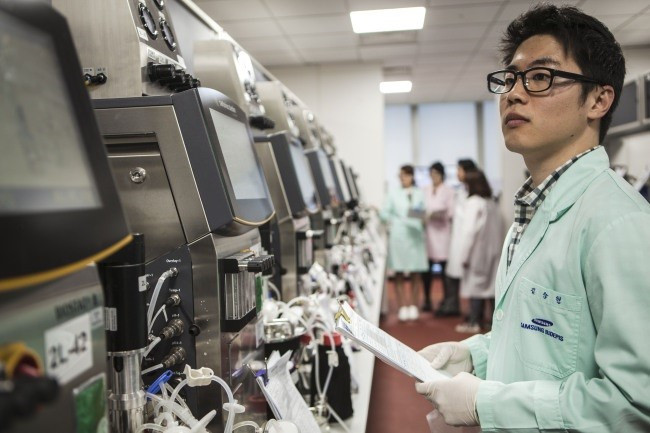Samsung Bioepis’ Enbrel biosimilar won a supply deal from Denmark’s drug procurement agency Amgros on Tuesday, becoming the priority etanercept drug used for treating rheumatoid arthritis in the country, an industry source told The Korea Herald on condition of anonymity.
Benepali, Samsung’s biosimilar version of Amgen’s top-selling Enbrel, is expected to take away at least 50 percent of the original drug’s market share in Denmark, as local hospitals and doctors favor prescribing drugs selected by the procurement agency, he said.
Denmark, though a relatively small market in Europe, has one of the quickest expanding biosimilar usage rates in the world, the official said, projecting a steady sales outlook for Benepali.
 |
A Samsung Bioepis employee (Samsung Bioepis) |
Denmark is now the fifth European country in which Benepali is being sold, Samsung Bioepis confirmed to The Korea Herald. The drug obtained endorsement of state-run agencies in Norway, Germany, the U.K. and the Netherlands earlier this year.
Biosimilars refer to an emerging category of cheaper, near replicas of complex, biologic drugs which have lost patent protection. Enbrel lost its exclusive patent in Europe in February 2015, opening the doors to biosimilar competition.
Samsung’s Benepali was approved by the European Commission on Jan. 17, becoming the first Enbrel biosimilar to enter the European market. Enbrel’s net sales in Europe reached about $2.5 billion in 2014.
Denmark’s pricing of Benepali has yet to be disclosed. However, biosimilars are typically priced 40-50 percent cheaper than the original drugs. U.S. pharmaceutical company Biogen is Samsung’s marketing and sales partner in Europe, including in Denmark.
"We have already launched Benepali in the UK, Norway, Germany, and Netherlands. With EMA approval of Benepali earlier this year, we expect to launch it in other EU countries this year," Biogen told The Korea Herald in a statement.
Samsung Bioepis is the biopharma affiliate of Korean electronics giant Samsung Group. The group holds high hopes for its biosimilars business led by Bioepis, as a promising field to lead the conglomerate’s future growth.
The IMS Institute for Healthcare Informatics predicts biosimilars will save as much as $110 billion for health systems in Europe and the U.S. by 2020.
Bioepis has set a target revenue of 1 trillion won ($872 million) by 2020, which hinges on the successful commercialization of its biosimilars in the U.S. and Europe, the world’s top two biopharmaceuticals markets.
Established in 2012, Samsung Bioepis is working on a pipeline of 13 biosimilar candidates. Its Enbrel biosimilar is now sold in the four European countries as well as in Korea.
Its Remicade (infliximab) biosimilar received a positive approval recommendation from the European Medicines Agency earlier this month.
By Sohn Ji-young (
jys@heraldcorp.com)






![[Herald Interview] 'Trump will use tariffs as first line of defense for American manufacturing'](http://res.heraldm.com/phpwas/restmb_idxmake.php?idx=644&simg=/content/image/2024/11/26/20241126050017_0.jpg)
![[Exclusive] Hyundai Mobis eyes closer ties with BYD](http://res.heraldm.com/phpwas/restmb_idxmake.php?idx=644&simg=/content/image/2024/11/25/20241125050044_0.jpg)
